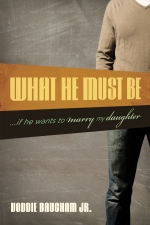 Voddie Baucham Jr. has just written a fascinating and somewhat provocative new book: What He Must Be …If He Wants to Marry My Daughter (Crossway). Crossway was kind enough to give me a preview of the book, and my wife and I were quite pleased as we skimmed through it last night. Baucham is saying things which need to be said, and he does so in a winsome, interesting style.
Voddie Baucham Jr. has just written a fascinating and somewhat provocative new book: What He Must Be …If He Wants to Marry My Daughter (Crossway). Crossway was kind enough to give me a preview of the book, and my wife and I were quite pleased as we skimmed through it last night. Baucham is saying things which need to be said, and he does so in a winsome, interesting style.
As part of a Crossway blog book tour, I’m going to post a couple excerpts of the book, and provide a mini-review of it. Feel free to ask questions about the book, I can send those on to Crossway and/or the author himself too, if they are good enough.
Here’s today’s excerpt, an interesting look at the familiar tale of Romeo and Juliet.
…As fathers, we must teach our children to go beyond technical virginity to biblical purity. We must protect their hearts.
The classic illustration of this caution for fathers is Shakespeare’s Romeo and Juliet. We usually think of Romeo and Juliet as a classic love story. However, we must remember that the principal characters paid for their illicit romance with their lives. Juliet is the classic example of an unprotected young woman who gave her heart away and paid a dear price. She “fell in love” with a young man she barely knew, hid the romance from her family, ignored all the warning signs, cherished stolen moments, committed herself irrationally and prematurely, and in the end died at her own hand.
Reading the story as a “neutral” or “passive” observer may leave you mourning the tragedy of two people who found “true love” and lost it because of their pigheaded families, but sifting the story through a biblical grid sheds a different light. You may say, “Romeo and Juliet is just a story.” However, I would argue that it is much more than that. In fact, I believe the only reason this story has stood the test of time is the fact that it depicts, although melodramatically, an all-too-familiar reality. Romeo and Juliet is the timeless story of the passion, bliss, and ignorance of young love (and of course, the foolishness of unresolved blood feuds).
This is a story that has been played out thousands, if not millions of times all across the globe. It may not always end in suicide (though sometimes it does), but it always ends with a price being paid. Sometimes that price is something as small as a romance that lives in the heart and mind of someone who ends up married to another. Other times the price is a dysfunctional marriage based on decisions made at the height of passion (and often rebellion). In any case, it is important to count the cost as we consider how we will approach the courtships of our daughters. [pages 167-168]
So, what do you think? Is he right? Do you have questions about his approach? You can find out more about the book at Crossway.com, or at its product page at Westminster Bookstore.
Is he right that fathers ought to teach their children to keep their hearts pure in addition to maintaining a technical virginity? Well, of course, the answer is yes. And doesn’t that responsibility make you drop to your knees and cry for help from the only one who can truly affect hearts? This looks like a job for Jesus!
That is a great statement: technicality vs. purity.
I hear you, John (Chitty). It is a humbling responsibility. And yes, Jon (Daley), technically pure versus real purity is an important distinction.
Stay tuned for a fuller review of the book. And I’ll be having a book giveaway too!
Well, was I surprised…I’ve skimmed past several reviews of this particular book in the past few weeks, but never really paid much attention as one with all her children in the 35 plus category. My prevailing thought was. “been there read that!” (Speaking of the type of book, not the particular one.)
This morning I decided to actually read your post. And was surprised at this “review” of Romeo and Juliet. The words…blood feud…illicit romance ends in death…took on a completely different meaning in the light of God’s love for us. But then, all the great stories…those that echo through the halls of time…always do…
Don’t you think you’re confusing “Biblical” principles with Patriarchal ones?